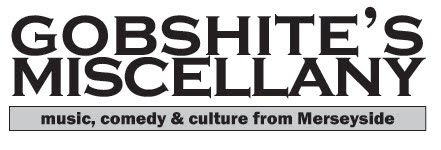KEVIN Sampson’s 1999 novel Awaydays was a firm favourite in Miscellany Towers on its release and indeed we interviewed the author (for the late and much lamented Liverpool listings mag Bigmouth) on its release at the arse end of the last century.
Even then, interviewed in the now closed Letters pub in Birkenhead (a key location in the novel) and before the massive success of Awaydays and his subsequent books, Sampson was intent on turning it into a movie.
And now a decade later he’s managed it and what a great success it is.
Centred around the quest for acceptance from working class football hard knocks of slightly posh 19-year-old West Wirral junior civil servant Paul Carty, Awaydays is ultimately a touching tale of unrequited love(s).
Written by Sampson, produced by David A. Hughes and directed by Pat Holden it is a beautiful evocation of Britain in the bleak early years of Thatcher’s Britain. (I think I may have written almost the same sentence in the original interview.)
Carty, a music and fashion obsessed suburban lad, wants to escape his humdrum existence after the death of his mother by integrating into The Pack, a gang of North End Birkenhead scally Tranmere Rovers hooligans who travel away to matches across the North of England looking for rucks with the skinhead gronks of Huddersfield, Crewe and Doncaster.
Carty’s entry into this world is via the friendship of Mark ‘Elvis’ Elways, a member of The Pack who hides his love of Ezra Pound, Syd Barrett and Sylvia Plath under a façade of Stanley knife drunken thuggery.
He also barely hides his love for Carty under the twin schizophrenic and anachronistic fronts of football violence and gig going in the small bohemian enclaves of late 70s Liverpool.
The film really works in that it ultimately improves the original novel by giving the relationship between Carty and Elvis an emotional depth that wasn’t there in the first place. Given the space to interact dramatically on screen, the dynamics of the relationship become heartbreakingly real and ultimately tragic.
Sampson, a master of Merseyside dialogue who drew favourable comparisons with Irvine Welsh when Awaydays came out, may just have found his real metier in scriptwriting.
The film also takes the book away from the then (in 1999) modish obsessions with the forensic detailing of 1980s Adidas trainers, trackie tops and the finer points of wedge haircuts which became the stock in trade of the legion of copycat hooligan publications that followed it.
It realises the hugely powerful human relationships which drive the story: Carty’s need to find a (good looking) girlfriend to fill the void of his mum, his sister Molly’s hurt at him not giving her more time in their grieving period and Elvis’ tragic inability to come out as gay in the macho confines of the working class environment in which he has grown up.
As Dr Mark Kermode pointed out yesterday on the Five Live film podcast it also works because it seems to have been shot on dull late 70s film which captures the mood of the era perfectly. Claustrophobic and washed out, it captures the bleakness of both the urban deprivation of the North End of Birkenhead, an area of Merseyside which has struggled to escape the pogroms of Thatcher’s social policies to this day.
It also captures the period without any of the knowingly ironic nostalgic tedium of the BBC's Life on Mars/ Ashes to Ashes franchise - the ultimately unrewarding and nonsensically cryptic televisual version of those Spandau Ballet/ Bananarama/ Curiosity Killed the Cat/ ABC reunion packages which routinely plague the arenas of Britain's largest cities.
However, it is in a handful of great performances where the film really succeeds. Nicky Bell and Liam Boyle as Carty and Elvis respectively are a brilliant double act and the latter really captures the torment of crisis stricken working class aesthete headed for smack addiction.
Stephen Graham as The Pack’s leader John Godden could have phoned his performance in from the set of a Guy Ritchie picture, but instead shines once again with a sure handed charisma few actors are blessed with. He is a hugely underestimated actor and holds The Pack together convincingly.
However the best performace is by Mancunian actor Holliday Grainger as Molly. She is just the correct mixture of vulnerable, loving and angry required from the original novel. Incredibly, she looks exactly like I imagined Molly when I read the book first.
Finally, the film has the best soundtrack of any movie, ever. The Bunnymen, early Ultravox and the Cure form the core, and drive the movie in much the same way as Public Enemy did Spike Lee’s Do the Right Thing.
But, the combination of Nicky Bell looking uncannily like Ian Curtis, and the inclusion of tragic singer's music means it’s going to be solid Joy Division for a week or so at Miscellany Towers.
Now that has to be a great outcome of going to see any movie, even one you have waited 10 years for.

No comments:
Post a Comment